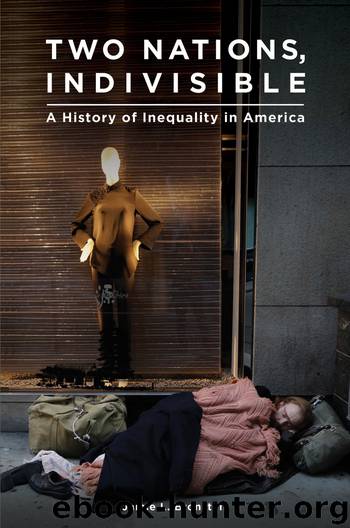Two Nations, Indivisible: A History of Inequality in America by Bronstein Jamie;

Author:Bronstein, Jamie;
Language: eng
Format: epub
Publisher: ABC-CLIO
Published: 2016-02-25T16:00:00+00:00
DELINEATING THE PROBLEM IN THE 1960s
Prosperity during the 1950s was bounded by geography and economic sectors as well as by race. Agricultural mechanization meant that large numbers of farm workers were only needed at harvest time. This forced workers to migrate to be able to live, and meant that they would be unemployed for portions of the year and living in grinding poverty most of the time. Housing for migratory workers was substandard, educational opportunities for their children almost nonexistent, and farm laborers lacked minimum wages and other federal protections. A 1960 Presidential Committee on Migratory Labor recommended reform of farm labor, including eligibility for the minimum wage.23
On the night after Thanksgiving in 1960, the well-respected journalist Edward R. Murrow raised public awareness of farmworkers’ problems with an hour-long documentary program, Harvest of Shame. It had taken nine months to film and traced the journeys of various migrant families through that year’s harvest. Harvest of Shame showed men, women, and children—the vast majority of whom were African American—who were treated little better than slaves, deprived of sanitary conditions and health care, packed into trucks standing up to be taken to the fields. The program also illustrated the contempt that some employers had for their employees. As Florida farmer Howard Jones was quoted as saying, “They eat today and they don’t think about tomorrow … but they are happier than we are. They are the happiest race of people on earth.”24 Charles Schuman, president of the National Farm Bureau, argued that farm laborers were otherwise unemployable, so it was better for them to earn a pittance rather than be idle. He boasted that only farm employers provided the “perquisite” of housing to their employees, an incalculable benefit.25
Harvest of Shame left some of the burden of interpretation to the viewer. Some of the farm laborers had very large families to feed, a fact displayed without comment or context. Thirty-four-year-old “Mrs. Dobey,” a white woman with nine children, could only buy her family one gallon of milk a week; 29-year-old Aline King left her nine-year-old son to watch three toddlers in a squalid camp shack while she picked beans in the field for a dollar a day. When interviewed, King said that she had been working in the fields since the age of eight and had 14 children. Murrow and show producer Fred Friendly gave little sense of what might concretely be done to improve the living conditions of the migrants or the educational prospects of their children, gesturing vaguely in the direction of farmworkers’ unions while at the same time acknowledging the extreme imbalance of power between the migrants and their farm employers.
Harvest of Shame was part of a larger discourse about hidden poverty and the costs of economic inequality that emerged in the late Eisenhower administration and then grew louder in the 1960s. In 1962, the historian Gabriel Kolko published Wealth and Power in America. The economist Simon Kuznets had claimed that income in the United States necessarily would become more evenly distributed over time.
Download
This site does not store any files on its server. We only index and link to content provided by other sites. Please contact the content providers to delete copyright contents if any and email us, we'll remove relevant links or contents immediately.
| General | Discrimination & Racism |
Nudge - Improving Decisions about Health, Wealth, and Happiness by Thaler Sunstein(7237)
iGen by Jean M. Twenge(5156)
The Fire Next Time by James Baldwin(5014)
Adulting by Kelly Williams Brown(4230)
The Hacking of the American Mind by Robert H. Lustig(4080)
The Sports Rules Book by Human Kinetics(4072)
The Ethical Slut by Janet W. Hardy(4036)
Captivate by Vanessa Van Edwards(3721)
Mummy Knew by Lisa James(3518)
In a Sunburned Country by Bill Bryson(3360)
The Worm at the Core by Sheldon Solomon(3324)
Ants Among Elephants by Sujatha Gidla(3278)
Suicide: A Study in Sociology by Emile Durkheim(2900)
The Slow Fix: Solve Problems, Work Smarter, and Live Better In a World Addicted to Speed by Carl Honore(2837)
The 48 laws of power by Robert Greene & Joost Elffers(2794)
Humans of New York by Brandon Stanton(2682)
Handbook of Forensic Sociology and Psychology by Stephen J. Morewitz & Mark L. Goldstein(2602)
The Happy Hooker by Xaviera Hollander(2580)
The Tipping Point by Malcolm Gladwell(2552)
